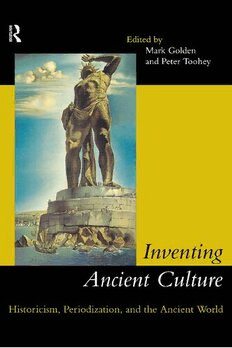
Inventing Ancient Culture: Historicism, Periodization and the Ancient World PDF
Preview Inventing Ancient Culture: Historicism, Periodization and the Ancient World
INVENTING ANCIENT CULTURE Inventing Ancient Culture discusses aspects of antiquity which we have tended to ignore. It asks the reader how far we have reinvented antiquity, by applying modern concepts and understandings to its study. Furthermore, it challenges the common notion that perceptions of the self, of modern societal and institutional structures, originated in the Enlightenment. Rather, the authors and contributors argue, there are many continuities and marked similarities between the classical and the modern world. Mark Golden and Peter Toohey have assembled a lively cast of contributors who analyse and argue about classical culture, its understandings of philo- sophy, friendship, the human body, sexuality and historiography. To what extent have cultural systems changed or remained the same since antiquity? Are our understandings of marriage, of friendship or of romantic love really that different from those in the ancient world? Inventing Ancient Culture presents a wide array of positions on such questions, both from an empirical and from a theoretical angle. Usefully illustrated, it will act as an exciting introduction to new approaches in Classical Studies for both beginning and more experienced students. Mark Golden is Professor of Classics at the University of Winnipeg. He is the author of Children and Childhood in Classical Athens (1990). Peter Toohey is Associate Professor in Classics and Ancient History at th e University of New England, New South Wales. He is the author of Reading Epic (1992) and Epic Lessons (1996). INVENTING ANCIENT CULTURE Historpiecriisomd,ia znadt ion, thaen ciweonrtl d EditbeMda rGko lden y anPde tTeoro he y LondaonnNd e wY ork First published 1997 by Routledge 11 New Fetter Lane, London EC4P 4EE 29 West 35th Street, New York, NY 10001 Selection and editorial matter © 1997 Mark Golden and Peter Toohey individual chapters © the contributors Typeset in Garamond by Ponting-Green Publishing Services, Chesham, Buckinghamshire All rights reserved. No part of this book may be reprinted or reproduced or utilized in any form or by any electronic, mechanical, or other means, now known or hereafter invented, including photocopying and recording, or in any information storage or retrieval system, without permission in writing from the publishers. British Library Cataloguing in Publication Data A catalogue record for this book is available from the British Library Library of Congress Cataloging in Publication Data Inventing ancient culture: historicism, periodization and the ancient world / edited by Mark Golden and Peter Toohey p. cm. Includes bibliographical references and index. 1. Greece-Civilisation-To 146 B.C. 2. Rome-Civilisation. 3. Greece-History-To 146 B.C.-Periodization. 4. Rome-History-Periodization. 5. Social change. 6. Social evolution. 7. Social structure. I. Golden, Mark, 1948- . II. Toohey, Peter, 1951- DE59.I58 1996 938-dc20 96-14853 CIP ISBN 0-415-09959-5 (hbk) ISBN 0-415-09960-9 (pbk) For ft Katie Rose Becker-Golden, Max Becker-Golden, Kathleen Toohey, and Matthew Toohey CONTENTS List of illustrations ix List of contributors x GENERAL INTRODUCTION 1 Mark Golden and Peter Toohey Part I Antiquity and the Enlightenment: Inventing the present INTRODUCTION 13 Mark Golden and Peter Toohey 1 TOWARDS A HISTORY OF BODY HISTORY 16 Amy Richlin 2 PAINTERS AND PEDERASTS: ANCIENT ART, SEXUALITY, AND SOCIAL HISTORY 36 Martin Kilmer 3 TRIMALCHIO'S CONSTIPATION: PERIODIZING MADNESS, EROS, AND TIME 50 Peter Toohey 4 PHILOSOPHY, FRIENDSHIP, AND CULTURAL HISTORY 66 David Konstan 5 CONTINUITY AND CHANGE IN ROMAN SOCIAL HISTORY: RETRIEVING 'FAMILY FEELING(S)' FROM ROMAN LAW AND LITERATURE 79 Suzanne Dixon Part II Reconstructing the past: The practice of periodization INTRODUCTION 93 Mark Golden and Peter Toohey vii CONTENTS 6 PERIODIZATION AND THE HEROES: INVENTING A DARK AGE 96 Ian Morris 7 RECONSTRUCTING CHANGE: IDEOLOGY AND THE ELEUSINIAN MYSTERIES 132 Christiane Sourvinou-Inwood 8 THE PROBLEM OF PERIODIZATION: THE CASE OF THE PELOPONNESIAN WAR 165 Barry S. Strauss 9 CHANGE OR CONTINUITY? CHILDREN AND CHILDHOOD IN HELLENISTIC HISTORIOGRAPHY 176 Mark Golden 10 DID ROMAN WOMEN HAVE AN EMPIRE ? 192 Phyllis Culham References 205 Index 235 Vlll ILLUSTRATIONS PLATES Plate 1: Red-figure vase, c. 500-470 BCE by the Briseis Painter. Paris G278, Florence ZB27. ARV2 407.16 (Briseis Painter); Add 2 232 (=R539). 38 Plate 2: Red-figure vase, c. 500-470 BCE, by Douris. Munich 2631. ARV2 443.224 (Douris); Add2 240; GH R573 (=R573) 39 Plate 3: Red-figure cup, c. 510-500 BCE, by the Ambrosios Painter. Rome, Villa Giulia 50458. ARV2 173.5. (Ambrosios Painter) Para 338; Add2 184; (=R283). 40 Plate 4: Red-figure vase, c. 515-500 BCE, by the Carpenter Painter. Malibu 85.AE.25. Bothmer 1986 (attr. Carpenter Painter); Dierichs (1988) 117d; Halperin (1990) Frontispiece (=R308.1) 41 Plate 5: Red-figure vase, c. 500 BCE, by the Kiss Painter. Berlin 2269. ARV2 177.1 (Kiss Painter); Para 339; Add2 185; Dierichs (1988) 117a; GH 303; Keuls (1985) pi. 174 (=R303). 42 Plate 6: Red-figure vase, early fifth century BCE, by the Triptolemos Painter. Mykonos. ARV2 362.21 (Triptolemos painter); Add2 222; Koch-Harnack (1983) fig. 15; GH R502 (=R502). 43 Plate 7: Black-figure Tyrrhenian amphora, c. 550-530 BCE, by the Guglielmi Painter. Guglielmi Painter (Bothmer), Tyrrhenian, Orvieto, Faina 2664 (1955 VG 38). ABV 102. 100, 684; Para 38; Add2 27; Wojcik (1989) figs 1.1-1.4. 44 Plate 8: Tripod pyxis, c. 525-515 BCE, by the Amasis Painter, from the Aphaia sanctuary on Aigina. 45 Plate 9: Black-figure amphora, c. 550-520 BCE, by the Affecter Painter. London, British Museum 1836.2-24.46. ABV 243.45; Add2 62 (=B153). 46 IX
